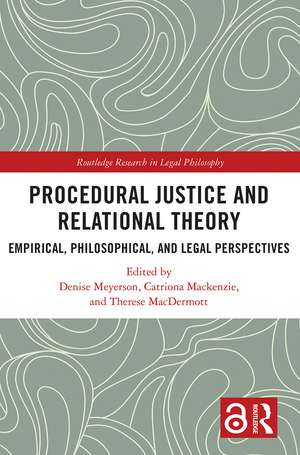Procedural Justice and Relational Theory: Empirical, Philosophical, and Legal Perspectives: Routledge Research in Legal Philosophy
Editat de Denise Meyerson, Catriona Mackenzie, Therese MacDermotten Limba Engleză Paperback – 29 apr 2022
Empirical research establishes that people’s understanding of procedural justice is shaped by relational factors. A central premise of this volume is that this research is significant but needs to be complemented by normative theorizing that draws on relational theories of ethics and justice to explain the moral significance of procedures and make normative sense of people’s concerns about relational factors. The chapters in Part 1 provide comprehensive reviews of empirical studies of procedural justice in policing, courts and prisons. Part 2 explores empirical and normative perspectives on procedural justice and legitimacy. Part 3 examines philosophical approaches to procedural justice. Part 4 considers the implications of a relational perspective for the design of procedures in a range of legal contexts.
This collection will be of interest to a wide academic readership in philosophy, law, psychology and criminology.
| Toate formatele și edițiile | Preț | Express |
|---|---|---|
| Paperback (1) | 319.35 lei 3-5 săpt. | +24.07 lei 6-12 zile |
| Taylor & Francis – 29 apr 2022 | 319.35 lei 3-5 săpt. | +24.07 lei 6-12 zile |
| Hardback (1) | 666.23 lei 3-5 săpt. | +30.55 lei 6-12 zile |
| Taylor & Francis – 30 oct 2020 | 666.23 lei 3-5 săpt. | +30.55 lei 6-12 zile |
Preț: 319.35 lei
Nou
Puncte Express: 479
Preț estimativ în valută:
61.11€ • 64.26$ • 50.49£
61.11€ • 64.26$ • 50.49£
Carte disponibilă
Livrare economică 27 martie-10 aprilie
Livrare express 12-18 martie pentru 34.06 lei
Preluare comenzi: 021 569.72.76
Specificații
ISBN-13: 9780367565176
ISBN-10: 036756517X
Pagini: 264
Ilustrații: 3
Dimensiuni: 156 x 234 x 21 mm
Greutate: 0.49 kg
Ediția:1
Editura: Taylor & Francis
Colecția Routledge
Seria Routledge Research in Legal Philosophy
Locul publicării:Oxford, United Kingdom
ISBN-10: 036756517X
Pagini: 264
Ilustrații: 3
Dimensiuni: 156 x 234 x 21 mm
Greutate: 0.49 kg
Ediția:1
Editura: Taylor & Francis
Colecția Routledge
Seria Routledge Research in Legal Philosophy
Locul publicării:Oxford, United Kingdom
Public țintă
PostgraduateCuprins
Introduction: procedural justice in law, psychology, and philosophy
Part I Procedural justice in policing, courts and prisons: empirical reviews
1. The empirical study of procedural justice policing in Australia: highlights and challenges
2. Procedural fairness and jury satisfaction: an analysis of relational dimensions
3. Procedural justice in corrections
Part II Procedural justice and legitimacy: empirical and normative perspectives
4. Procedural justice, legitimacy and social contexts
5. Procedure-content interaction in attitudes to law and in the value of the rule of law: an empirical and philosophical collaboration
6. Legal legitimacy and the relevance of participatory procedures
Part III The concept of procedural justice: philosophical perspectives
7. The inadequacy of instrumentalist theories of procedural justice
8. The many facets of procedural justice in legal proceedings
9. Procedural justice, relational equality and self-respect
Part IV Implications and applications: legal institutions and the exercise of legal authority.
10. Racial profiling as pejorative discrimination
11. Administrative discretion and governing relationships: situating procedural fairness
12. The framing of tribunal procedures: a question of balance or a participation-centred approach?
Part I Procedural justice in policing, courts and prisons: empirical reviews
1. The empirical study of procedural justice policing in Australia: highlights and challenges
2. Procedural fairness and jury satisfaction: an analysis of relational dimensions
3. Procedural justice in corrections
Part II Procedural justice and legitimacy: empirical and normative perspectives
4. Procedural justice, legitimacy and social contexts
5. Procedure-content interaction in attitudes to law and in the value of the rule of law: an empirical and philosophical collaboration
6. Legal legitimacy and the relevance of participatory procedures
Part III The concept of procedural justice: philosophical perspectives
7. The inadequacy of instrumentalist theories of procedural justice
8. The many facets of procedural justice in legal proceedings
9. Procedural justice, relational equality and self-respect
Part IV Implications and applications: legal institutions and the exercise of legal authority.
10. Racial profiling as pejorative discrimination
11. Administrative discretion and governing relationships: situating procedural fairness
12. The framing of tribunal procedures: a question of balance or a participation-centred approach?
Notă biografică
Denise Meyerson, Macquarie Law School, Macquarie University, Sydney.
Catriona Mackenzie, Department of Philosophy, Macquarie University, Sydney.
Therese MacDermott, Macquarie Law School, Macquarie University, Sydney.
Catriona Mackenzie, Department of Philosophy, Macquarie University, Sydney.
Therese MacDermott, Macquarie Law School, Macquarie University, Sydney.
Descriere
This book bridges a scholarly divide between empirical and normative theorizing about procedural justice in the context of relations of power between citizens and the state. It will be of interest to a wide academic readership in philosophy, law, psychology and criminology.















